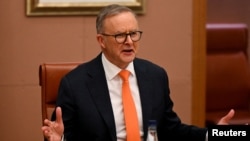Australian Prime Minister Anthony Albanese says he wants to meet Chinese President Xi Jinping, on the sidelines of one of the summits being held this month in Southeast Asia if arrangements can be made. Albanese leaves Friday for an East Asia Summit in Cambodia followed by next week’s G-20 summit in Bali, Indonesia, as well as the Asia-Pacific Economic Cooperation meeting in Thailand. Analysts say China and Australia are keen for recent tensions to ease but warn that fundamental differences will remain.
The interest in a meeting between Australia’s prime minister and the Chinese leader is seen by some analysts as Canberra’s effort to reset relations with Beijing.
“I have made it very clear that dialogue is a good thing,” Prime Minister Anthony Albanese told reporters in Canberra on Wednesday. “If a meeting is arranged with Xi, then that would be a positive thing. We will make an announcement if and when meetings with various leaders are locked in.”
Relations between Australia and China, its biggest trading partner, have deteriorated in recent years. Analysts cite various geopolitical issues as reasons why relations between the two countries are fraught.
Canberra’s call for an inquiry into the origins of the COVID-19 virus, which was first detected in China, was seen in Beijing as a criticism of its handling of the early stages of the pandemic. Criticism of human rights violations and the treatment of China’s Uighur Muslim minority and tensions over recognizing Taiwan have also deepened the diplomatic rift. It has affected trade, with China imposing what analysts have said were punitive restrictions on a range of Australian exports, including barley and wine.
Albanese’s center-left government, which won an election in May, is keen to reengage with Beijing while cementing its long-established security ties with Washington.
On Tuesday, Australian foreign minister Penny Wong spoke with her Chinese counterpart, Wang Yi.
Hervé Lemahieu, the director of research at the Sydney-based Lowy Institute, an independent think tank, told VOA that while bilateral diplomatic tensions are easing, there will remain divisions between Canberra and Beijing.
“Essentially, the structural divide between the United States and China is here to stay, and Australia’s position as a strong U.S. ally is not going to change and, therefore, I think the fundamentals of the equation will remain rather tense,” he said. “But, of course, there is probably a benefit to be had in a bit more stability, a bit more predictability and a bit more exchange at top levels between China and Australia.”
The last time an Australian prime minister met with President Xi was in 2017 on the sidelines of the G-20 meeting in Hamburg, Germany.
Prime Minister Albanese leaves Australia on Friday to attend various regional and international summits in Cambodia, Indonesia and Thailand.




